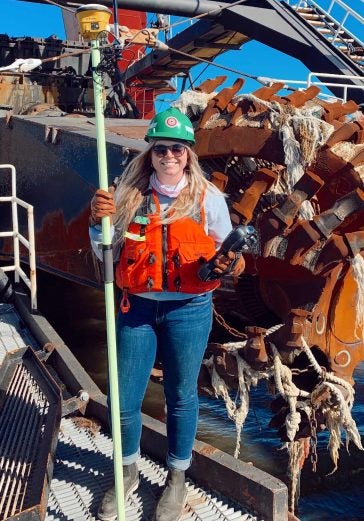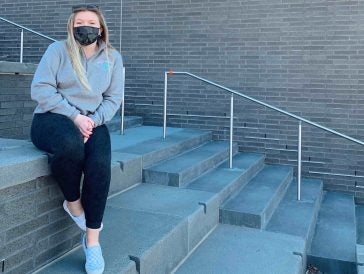
By Neil Nachbar
Most dredging operations take place without people really noticing. After all, they’re usually far away from public view and much of the work happens underwater.
Faith Leonard, an ocean engineering major at the University of Rhode Island, had the rare opportunity to participate in a dredging operation while doing an internship on her winter break.
From Dec. 22 to Jan. 20, Leonard received valuable hands-on experience on a project conducted by the Great Lakes Dredge & Dock Corporation in Wilmington, North Carolina. The project, which involved a channel deepening and a beach replenishment, coincidentally started when Leonard arrived.
“Because I came onto the project at the beginning, I was able to help out with the entire start-up process,” said Leonard.

The Bradford, New Hampshire native worked seven days a week in a rotation with the engineers on the project. One of her first tasks was to create the maps and preliminary designs for the project, which required going on one of the survey boats to map the seafloor and the depth of the channel, as well as mapping the beach.
“I conducted hydro surveys using multi-beam and single beam sonar, I worked with virtual reference stations using a global positioning system and a global navigation satellite system, and I used information provided to us by the Army Corps of Engineers,” said Leonard.
Besides working on two survey boats, Leonard also worked on a tugboat and a cutter dredge. For the beach renourishment project, she helped assemble the Crab, a large surveying machine, and she set up the software on multiple bulldozers.
“I learned so much in such a short amount of time from this internship,” said Leonard. “The team I worked with inspired me to learn more about the dredging industry.”
Leonard found out about the internship opportunity at the College of Engineering’s annual career fair.
“The person who originally interviewed me from Great Lakes was not only a URI graduate, but also a former member of the URI engineering fraternity Theta Tau, which I belong to,” said Leonard. “Three out of the four people I spoke to were URI engineering alumni, which was definitely beneficial.”
Once on the work site, Leonard realized how many of the engineers attended URI.
“It gave us some common ground right off the bat,” said Leonard. “My mentors were able to relate to the classes that I’ve taken, which prepared me for the internship.”
Leonard will earn her bachelor’s degree in ocean engineering in spring of 2022.
